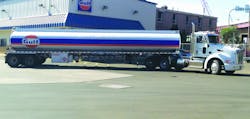Gulf Oil to supply LNG to truck fleets
Gulf Oil Limited Partnership (LP), a national, branded supplier of fuels including gasoline and diesel, has begun to get thoroughly involved in the market for liquefied natural gas (LNG) fuel for truck transportation, according to the firm’s CEO Joe Petrowski.
“We’ve identified supply and distributing LNG as a cost-effective and clean alternative fuel to fleets of Class 7-8 trucks as a key part of our business growth and diversification strategy,” Petrowski told FleetOwner.
Petrowski said the LNG effort kicked off last year when Gulf added 34 Peterbilt Model 386 LNG-fueled tractors to its own distribution fleet, which includes 75 petroleum-fuel tanker rigs as well as delivery trucks that supply its Cumberland Farms-branded convenience stores. And next month, Gulf will take delivery of its first LNG tanker trailer.
While those 34 Petes are powered by Cummins Westport 15-liter engines that feature high-pressure direct injection (HPDI) systems, the company is also planning to test both 9- and 12-liter LNG engines in its fleet, Gulf senior vice president Laura Scott told FleetOwner. “The Cummins Westport 12-liter ISX12 G that’s will be available this year with its high torque rating in particular could be a game-changer, helping to drive up interest in LNG,” she noted.
Scott said the LNG truck purchase has not only enabled Gulf to save on vehicle fuel costs, but serves to demonstrate to potential fleet customers both the operation and fuel-cost savings of LNG–fueled trucks over diesel-powered ones.
“We intend to convert more of our fleet to LNG as well as supply LNG to our customers,” said Scott. “The economic benefits [of LNG] are remarkable.” She pointed out that fleets with more than 10 trucks that use at least 20,000 gallons per year in a “return-to-base operation” can “expect to lock in an after-tax internal rate of return in the 20% to 35% range. For our own fleet, we locked in a five- year discount against diesel costs to guarantee a significant return on investment.”
Scott also noted that Gulf will assist its LNG customers “in all aspects of conversion, including vehicle selection, acquisition, [fuel] hedging, operations and regulatory requirements.”
According to Petrowski, a big factor in Gulf’s decision to add LNG truck fuel to its product mix is the “1,000 pieces of fueling property we have access to, including 600 company store locations and 400 operated by third parties on property we own.
“We originally thought of building compressed natural gas (CNG) fueling terminals, such as the one we have at the Newark [NJ] airport,” he continued. “But the more we looked at our target customer base of Class 7-8 truck operators, we came up against the question of whether CNG would provide the range and torque they need. Plus, there is the extra cost of pipelining CNG [to a fueling site].
“Instead of pursuing CNG at this time, we developed our concept for producing LNG closer to where it is needed and then transferring it by truck to fueling sites,” Petrowski added. “With the infrastructure we already have, it’s not a huge leap to start offering LNG.”
On the other hand, Scott pointed out that in the marketplace “there’s still room for both LNG and CNG. And if the torque and range aspects of CNG vehicles change, we would look at offering it. We’ll stay on top of the technology and we can adjust our offerings quickly as we are a very nimble company.”
“Natural gas can provide significant cost benefits as a transportation fuel source, while burning cleaner and reducing dependence on foreign oil,“ stated Petrowski. “We believe the most effective way to increase market penetration for natural gas is for large, centrally fueled fleets that ‘self-supply’ to lock in the current spread between natural gas and diesel.”
Petrowski noted that Gulf’s LNG customers will know on a daily basis what price they are paying for the fuel and so will not need to rely on a third party’s retail price.
Gulf Oil Limited Partnership distributes motor fuels through a network of more than 2,500 branded gasoline retail centers, 12 proprietary oil terminals and more than 130 other supply points. Gulf Oil supplies gasoline, heating oil, diesel fuel, jet fuel and kerosene through its terminal network.
